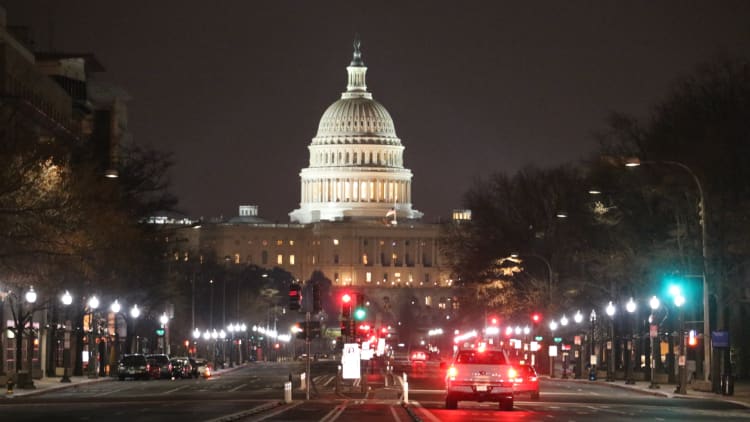Congress is poised to push through a massive spending bill this week. And politicians are using the opportunity to help fix the pensions and health-care benefits for one group of workers: coal miners.
The measure would help ensure that the 1974 United Mine Workers of America Pension Plan won't become insolvent. The bill would help protect retirement benefits for 92,000 workers and health care benefits of about 13,000.
The measure was passed in a House of Representatives vote on Tuesday. And the Senate also is expected to approve it, since it has the endorsement of Senate Majority Leader Mitch McConnell, R-Ky.
"At my request, our legislation has been included in the government funding bill that will pass Congress and head to President Trump's desk to become law," McConnell said in a statement this week.
"I'm proud to continue to be a strong voice for coal miners, retirees and their families, and I look forward to voting to save their benefits," he said.
The legislation, called the Bipartisan American Miners Act of 2019, was also applauded by the United Mine Workers of America. The labor union's president, Cecil E. Roberts, said the move "will have saved the lives of thousands throughout America" once it goes through.
Yet the bill is notable for another reason: It potentially paves the way for more broad changes to so-called multiemployer pensions.
What the changes leave out
On Tuesday, Rep. Richard Neal, D-Mass., issued a statement urging lawmakers to include another piece of legislation, the Rehabilitation for Multiemployer Pensions Act, in the spending package.
In July, that bill, also known as the Butch Lewis Act, was approved by the House on a 264-to-169 vote.
That legislation included more sweeping reform for multiemployer pension plans as it paves the way for the Treasury Department to establish a trust fund to make loans to plans facing insolvency.
The measure, if passed, would represent a much bigger change compared to the miners' legislation. It would affect more individuals — some 1.3 million — who worked in other industries.
"Now, after working for decades as iron workers, truck drivers or auto workers, their planned retirements are in jeopardy," Neal said. "After forgoing pay raises to save for their futures, these Americans face financial uncertainty at a time when they are often unable to return to the workforce."
Neal called the exclusion of the legislation from this week's package an "egregious omission."
In recognition of the problem, Sens. Chuck Grassley, R-Iowa, and Lamar Alexander, R-Tenn., last month put forward their own proposal to help shore up multiemployer pension plans.
The plan calls for providing assistance to the most poorly funded plans while using "as little taxpayer dollars as possible," Grassley said. It also proposes a strategy to stabilize the multiemployer pension system and the long-term solvency of the Pension Benefit Guaranty Corporation, a federally chartered entity that supports insolvent pensions.
Opportunities for a broader fix
Some object to the miners' legislation for one key reason: It involves providing taxpayer assistance to a private sector pension plan, said Rachel Greszler, a research fellow at the Heritage Foundation, a conservative think tank.
Both the miners' and House-approved multiemployer reform are "just a pure bailout without any reform," Greszler said.
A better fix would be to come up with a plan that would minimize losses for those in insolvent plans and take taxpayer money out of the equation, she said.
That would require increasing the premiums the plans pay based on how well they are funded.
For many workers, it would also require benefit cuts to make sure the plan is still around when younger workers need it.

"The longer you wait, the more difficult and harmful it becomes to the people who are affected," Greszler said.
Joshua Gotbaum, a guest scholar for economic studies at Brookings Institution, said there are limited options to solve the problem without raising taxes.
With just one union company still in existence, raising the plan's premiums doesn't necessarily work, Gotbaum said.
Plus, cutting benefits would hit mineworkers, with an average pension of $4,000 a year, hard, he said.
"You don't want mineworker retirees … instead of getting $4,000 a year plus Social Security, getting $800," Gotbaum said.
Without this fix, the miners' pension fund could run out of money as soon as next year. Meanwhile, the other funds that are in trouble likely have a couple more years to go, Gotbaum said.
That paves the way for more negotiations in 2020 for an alternative to the Butch Lewis Act, which Senate Republicans have not embraced.
The good news is that it's likely that lawmakers on both sides will be willing to address the problem.
"Even when Congress is really split, you still have Democrats and Republicans who are willing to talk to each other about this issue," Gotbaum said. "They are aware of the human consequences of doing nothing."


